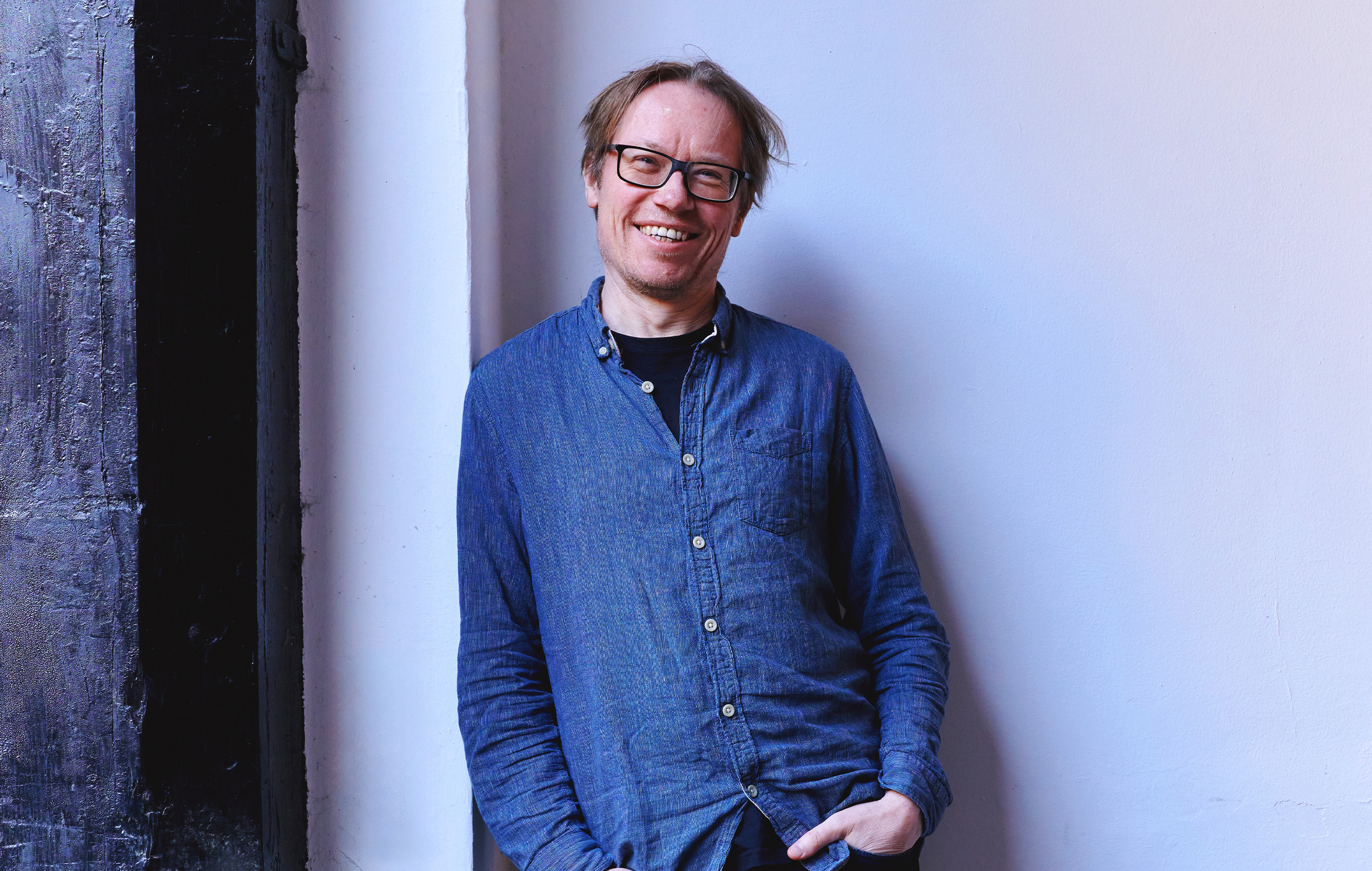In Copenhagen, Denmark, Ghost Ship Games CEO Søren Lundgaard is smiling. Behind him, colourful party bunting decorates the office of Ghost Ship, the studio he co-founded in 2016. The cause for celebration? Their first game, dwarfs-in-space shooter Deep Rock Galactic, is about to turn six. The company is also launching two titles as a publisher, something it has never done before. It’s all keeping Lundgaard incredibly busy – but from his easy grin and relaxed manner, you wouldn’t tell.
This is one of Lundgaard’s last interviews in the small, cosy building that Ghost Ship calls home. It was originally meant to house just 20 developers, but as the fledgling outfit has grown to 40 employees, the office has become a little bit too cosy, and they’re preparing to move somewhere roomier.
Credit: Tobias Hoffmann for NME
From its small abode, Ghost Ship has punched far above its weight. Millions of players have fallen in love with the capitalist camaraderie of Deep Rock Galactic, a co-op shooter in which four dwarfs team up to blast aliens and mine precious minerals. One minute you could be drilling through bright green rocks to reach a golden vein, another fending off bile-spitting flies and giant scorpions that were attracted by your noisy digging. The game’s Discord server boasts over 500,000 members, but on Zoom, Lundgaard tells NME that it only takes one manager to moderate because of how sweet their fans are.
In fact, Deep Rock Galactic’s fanbase is widely regarded as the friendliest in gaming – and their rallying cry, “rock and stone”, has become a wholesome internet joke. It’s nothing like the wider world of gaming. For many multiplayer games, abuse and toxicity make bonding with other players near-impossible. Death threats have become commonplace for developers. Last year, Rainbow Six Siege studio Ubisoft teamed up with Northumbria Police to try and curb abuse, while a Destiny 2 player was ordered to pay nearly £400,000 in damages for their “sociopathic” harassment of a community manager.
“The internet has grown faster than we have learned to behave on it,” Lundgaard suggests. “Now we’ve got new generations where the internet is innate. It’s going to be interesting to see how that evolves. I don’t think this is a gaming industry problem – I think it’s much broader than that, though it gets distilled in gaming and player-versus-player games specifically. Then you see it from the extreme side.”
“We concluded that it’s actually possible, through game design, to create a positive community, which is super nice to know”
However, he’s optimistic that gaming can drive change – and Deep Rock Galactic is proof of that. Although Ghost Ship didn’t intentionally set out to create the world’s greatest gaming community, Lundgaard says the game’s “working environment where you’re all working in the mines together” sets the right tone. He also credits their practice of “open development”, working transparently and getting players involved in future updates, for fostering a positive atmosphere. This approach encouraged friendlier two-way communication in Deep Rock Galactic’s earlier years, but it was put to the test in 2022, when the title was added to gaming subscription service PlayStation Plus.
“In one month, we got 10 million downloads and two or three million actually playing the game,” says Lundgaard. This time, Ghost Ship had no control over how they acted “because [their attitude] formed completely out of how the game played”. But to their delight, the wave of newcomers proved every bit as lovely as those already playing on Xbox and PC. “We concluded that it’s actually possible, through game design, to create a positive community, which is super nice to know.”
Credit: Tobias Hoffmann for NME
Though Deep Rock Galactic boasts millions of players, it all started with just six passionate developers. In 2016, Lundgaard heard that his long-time friend Mikkel Pedersen – now creative director of Ghost Ship – was forming a new studio with four others. Their Copenhagen office, conveniently, was in the same building as Lundgaard’s, who was working at small developer MovieStarPlanet at the time. When Lundgaard popped down to wish the fledgling founders luck, he was shown an early prototype of Deep Rock Galactic. It was “super crude,” he recalls, but you could immediately see the team’s influences – namely multiplayer survival shooter Left 4 Dead, and block-y sandbox adventure Minecraft.
“I quickly got the vibe that this could be something more than what we were looking at,” says Lundgaard, admitting he was a little “envious” of the group as they started on their journey. Within an hour of returning to his office, Pederson called Lundgaard and asked him to come back down. They wanted him to be their CEO, a position that Lundgaard had never held before. “I jumped in with both feet,” he says. “It’s been a fantastic ride ever since.”
Credit: Tobias Hoffmann for NME
Lundgaard thinks he was offered the role thanks to his ability to make calculated, well-informed decisions. That being said, joining Ghost Ship was a risk. During the first six months, there were hurdles – mostly challenges with tech and funding – but his hunch was eventually proved correct during a 2016 trip to trade fair Paris Games Week, where the founders searched for a publisher for Deep Rock Galactic. To their surprise, companies were desperate to work with them, and when Ghost Ship realised they had something truly special, they returned to Copenhagen to plan their future.
“We put up post-it notes with each opportunity, then decided to pick a few that we would likely never sign a deal with – to test how unfair a deal we could propose to them and still get into negotiations,” says Lundgaard. “One of them said that was the worst proposal he’d ever seen, and another said: ‘That’s not the best deal, but maybe we could talk anyway.’ That’s when we knew we really had something.”
The group eventually landed on Swedish game developer Coffee Stain Studios. “This was their first [time] publishing, we knew they would make mistakes,” says Lundgaard. “But we’d also make mistakes – it was a journey we could take together, and we really liked that aspect.” The rest is history. In 2018, Deep Rock Galactic debuted via Steam Early Access, a platform where PC games can be sold while still in development, and went on to sell more than eight million copies – a massive success on every level.
“I jumped in with both feet. It’s been a fantastic ride ever since”
Fast-forward to 2024, and Ghost Ship is now a role model for many. They recently started publishing other studio’s games, including fantasy card-battler SpellRogue and spin-off Deep Rock Galactic: Survivor. The future looks bright – but what’s next? As the likes of Cyberpunk 2077, League Of Legends and The Last Of Us release successful TV adaptations, we suggest that Deep Rock Galactic could do the same with a blue-collar Starship Troopers-style series.
“We were talking about it, and we’ve also been approached,” says Lundgaard. “It’s definitely viable, but we can’t do everything at once – and we would want to be involved. If we could just say ‘eh, you do it’, and not be involved, then it would happen, but that wouldn’t be the right thing to do.”
Though the studio has long outgrown its blocky prototype and team of six, their vision – positivity, optimism, and the best co-op games around – remains. Yet it’s the fans who have taken the developer this far, and when asked if there are any memories of them that he treasures, Lundgaard immediately starts gushing about last month’s Copenhagen Gaming Week festival, where he was invited to speak to 1400 schoolchildren aged 11 to 13.
Credit: Tobias Hoffmann for NME
“I had the pleasure of standing on the stage and telling them, for 20 minutes, how I became a game developer,” says Lundgaard, beaming again. “I mostly just talked about all of the nerdy stuff – I said it’s fine to play Dungeons & Dragons, computer games, board games, because it can all lead you to being a game developer. During that speech, I also briefly talked about Deep Rock Galactic – I asked, ‘Can I get a ‘rock and stone?’ and got a whole crowd rock and stone-ing back. Many of those kids came up afterwards and wanted to take pictures, it was really cool.”
In 10 years time, some of those kids may be taking small steps in their own gaming careers. They might even be working at Ghost Ship – Lundgaard says the company could have close to 100 employees by then. He’s keen to keep exploring the world of Deep Rock Galactic, and hopes Ghost Ship’s publishing arm takes off. Perhaps more people will follow Ghost Ship’s example, and make the world of gaming a nicer place. Whatever the future holds, we suspect that Lundgaard will still be smiling when it arrives.
The post How Søren Lundgaard is taking the toxicity out of video games appeared first on NME.




